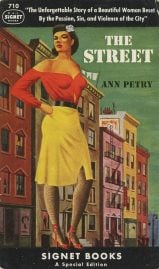
Hedges, the neighborhood madam, sees in her a great “business” opportunity Boots Smith, smooth-talking band leader, wants Lutie as a means of easing his own struggles and pains and Junto, white slumlord, wants Lutie as a personal concubine. This rosy-eyed outlook causes her to become the easy prey of many predators: The building superintendent sees her as the ultimate sexual conquest Mrs. These American ideals replace her husband, father, and any sense of community she isolates herself with this quest for wealth and a house with a white picket fence. Portraying the interrelationships among racism, sexism, and economic oppression-revealed through the struggles of Lutie Johnson, a beautiful brown woman, struggling as a single mother-The Street reveals the dreary despair of a black woman in the urban city whose plight can only end in crime and/or tragedy.Īt the beginning of the novel, Lutie and her son, Bub, move to 116th Street, intoxicated with the images of statesman Benjamin Franklin and the self-made individual. Harlem's 116th Street is the most foreboding character in the novel, and the book both begins and ends with its image, representing the evil in urban ghetto life. Petry's premise relies on environment being highly influential in determining one's life path. In 1985 Beacon Press reissued the novel as a part of the African American Women Writers series and in 1991, forty-five years after the original, Houghton Mifflin reissued The Street, because its theme made the book seem pertinent enough to have been written today.



At first publication, The Street received high acclaim, yet it went out of print for several decades. Critics often compare the novel to Richard Wright's Native Son (1942). Ann Petry's first novel, published in 1946 by Houghton Mifflin and winner of the Houghton Mifflin Literary Fellowship, The Street follows the tradition of naturalism and protest fiction while rejecting the traditions of the tragic mullato and the southern belle.


 0 kommentar(er)
0 kommentar(er)
